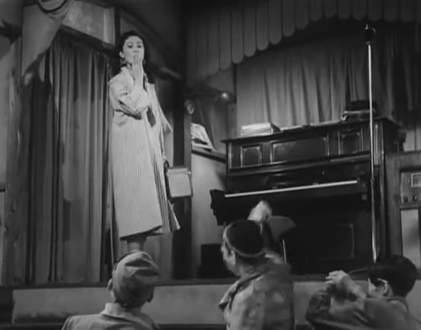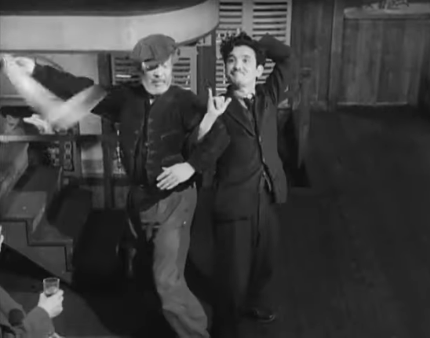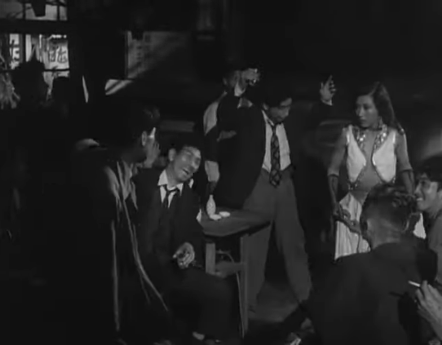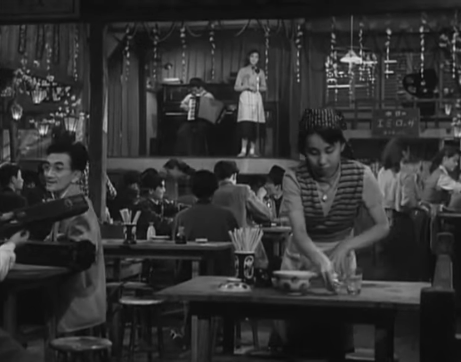Physical Address
304 North Cardinal St.
Dorchester Center, MA 02124

(Continued from Page 2)
Despite these satirical asides, though, Uchida’s vision of mid-1950s Japan seems on the whole remarkably positive. The recently repatriated director, having missed out on the struggle of his people, in the immediate aftermath of the war, among the physical and human wreckage of his native land – a battle which his peers, including Kurosawa, Ozu, Mizoguchi and Yoshimura, had captured on film so memorably in the late 1940s – must have been greatly impressed by the speed with which his countrymen had recovered from the trauma of defeat.

The vision of the Japanese nation that this film celebrates is of a people blessed with an almost boundless energy and will to survive. Even when they’re not doing what they really want in life – when classically-trained dancers need to work as striptease artists to eat, or gifted painters pass the time by playing pachinko – they put their whole heart and soul into their lives.
In particular, the vigor and cheerfulness of the barmaids in the film seem almost superhuman. Nothing, not even a violent customer, appears to faze them, and they’re as upbeat at the end of their working day, when one would think they’d be exhausted, as at the beginning of it. This positivity may be why I respond so much more strongly to this movie than to the darker, more overtly political and much more cynical film (A Hole of My Own Making) that Uchida made right after it.
Near the beginning of the movie, the barmaid Yuki goes on stage and, accompanied by Kenichi, rehearses the song “Beautiful Dreamer” by Stephen Foster (with Japanese lyrics). This movie is ultimately a tribute to the “beautiful dreamers” like Yuki and Emy Rosa and Kenichi and even Umeda, who are not living in the Japan they want, but who can’t quite give up their dream of someday doing so.
As exciting and clever and charming as Twilight Saloon is, the film suffers from a serious flaw. The central narrative conflict – the question of whether nice-guy Kenichi will abandon his beloved teacher to pursue his rightful career as a great opera singer – is dull, and more than a little Hollywood-trite.

Furthermore, Miyahara Takuya, who plays Kenichi, is a very inexpressive actor (he was obviously chosen for his singing skills rather than for his ability to act),1 while Ono Hiroshi, who plays Eto, is consistently over-expressive. (If IMDb can be trusted, this movie was to be the only film credit for either performer.) Even during the most delightful scene, when Umeda and Tetsuo do their comic dance as matador and bull to the tune of Bizet’s “Toreador Song,” it’s very frustrating that Uchida keeps cutting away from the two charming actors to boring close-ups of Kenichi singing.

On the other hand, the film’s main narrative effectively illustrates Uchida’s overarching theme: the pain – but also the necessity – of letting go of both people and the past. As the related subplot involving Emy Rosa and her demented ex-patron Taga demonstrates, the refusal to allow the people one has loved and nurtured to go their own way can destroy one’s life. (It’s not made clear – or perhaps I missed it – whether Taga attacks Emy Rosa out of sexual frustration, or because he’s appalled and disgusted that she’s been forced to prostitute her talents by becoming an erotic dancer. If the latter motive is true, the tragic ending of this relationship seems particularly poignant.)
What makes Umeda ultimately such an attractive character is precisely because his largesse has no strings attached. He doesn’t try to bind people to him through obligation. He simply wants them to enjoy, if possible, the peace of mind that he himself finds elusive.
This is the only surviving Uchida film that can be called a musical, and as one would expect of such an eclectic director, the music employed is all over the place stylistically. There’s the Stephen Foster tunes “Beautiful Dreamer” and “I Dream of Jeannie,” the traditional Japanese folk song, “Sakura,” military marches, ballads, leftist chants, opera (of course) and even a recording of the South African folk song “Brandy, Leave Me Alone,” in a popular recording by Josef Marais, played from a record player on the stage between the live performances.2

Except for the rather sappy orchestral theme heard over the opening and closing credits, all of this music is, as film scholars say, “diagetic”: that is, it’s not heard only by us, the audience, but also by the characters. However – and this seems to me remarkably true to life – the people in the bar, absorbed in their own problems and chatter, pay very little attention to most of it. To them, all this sound is just something in the air, like cigarette smoke. But to us, the music intriguingly complements Uchida’s visual virtuosity, and gives this work a buoyancy that few of his films can match.
It should be noted in passing that this movie has exactly the same running time, 94 minutes, as his previous one, A Bloody Spear at Mount Fuji. Both works demonstrate how much incident, emotion and truth this moviemaker could pack into a very short running time without ever seeming rushed.
The script for Twilight Saloon is credited to one “Nada Senzo.” On the Internet Movie Database, only one other credit (for a film and director I’ve never heard of) can be found for the name, which, when I first wrote this review, sounded to my ears like one of Ozu Yasujiro’s whimsical aliases from the prewar period (like “James Maki” or “Chuji Nozu,” or “Winthat Monnay” [without money]). My suspicions were fueled by the fact that “Nada” means “nothing” in Spanish, and “Senzo” sounds rather like the English word “sense” (thus: “nonsense”).
However, it should be noted that on the Japanese Movie Database, several other films not directed by Uchida include this name as a credited scriptwriter. And another blogger with a passion for reviewing obscure Japanese films, Martin Dowsing, has definitely established, in his article on this film, that Nada Senzo was in fact an actual person. Dowsing goes on to say, “when I dug a little deeper, I found information suggesting that Nada had been a novice screenwriter at the time [this film was made] and that his script somehow found its way to Uchida, with whom it obviously struck a chord.” He also notes that Nada later wrote for television (including a 45-minute remake of Twilight Saloon), and that a collection of his scripts was published in the 1980s. Lastly, Dowsing maintains that in 1962, Uchida directed a TV adaptation of his 1939 masterpiece, Earth, and that he hired Nada to compose the screenplay.
All this, however, does not preclude the possibility that Uchida either collaborated with Nada or extensively revised his original draft for Twilight Saloon, without claiming credit. The intriguing question of how much Uchida may have contributed to the scripts of his films is discussed in detail in my review of Hero of the Red-Light District.
Araki Toyohisa’s 2003 film, Someday I’ll Take the A Train (Itsuka ‘A’ torein ni notte), which I haven’t seen, is a remake of this movie.
One of Uchida’s most appealing works, this film achieves a very nice balance between satire and sentiment, and between cold realism and warm optimism in his depiction of postwar Japan.
Martin Dowsing (Obscure Japanese Film #28) – Mr. Dowsing in this blog post has clarified for me the identity of the film’s obscure screenwriter, Nada Senzo (see Commentary and Analysis above), for which I’m thankful.
Midnight Eye (Jasper Sharp)
Window on Worlds (Hayley Scanlon)
Screen Slate (K.F. Watanabe)
Hic Sunt Ninjas [Here are Ninjas] (Jérémie de Albuquerque) [In French] – A short and rather negative review
Kevin John Bozelka – Very interesting blog post about the music in the film
Yoyotei Krishna Diary/Reborn (“Master Takagi”) [In Japanese] – A reminiscence of screenwriter Nada Senzo, by someone who claims to have known him personally
Melbourne International Film Festival (MIFF, 2005 retrospective)
Museum of Modern Art (MOMA, 2016 Retrospective)
Berkeley Art Museum and Pacific Film Archive (BAMPFA)
[…] Twilight Saloon (Tasogare Sakaba; たそがれ酒場), 1955 […]
[…] the Japanese musical at New York’s Japan Society, another Uchida movie filmed a decade earlier, Twilight Saloon (Tasogare sakaba, 1955). This film painted a satirical yet sympathetic portrait of the denizens of […]
[…] continuing his acting career. His final performance for Uchida was as the bohemian artist Umeda in Twilight Saloon […]
[…] (Keisatsukan, 警察官), 1933A Bloody Spear at Mount Fuji (Chiyari Fuji; 血槍富士), 1955Twilight Saloon (Tasogare Sakaba; たそがれ酒場), 1955Chikamatsu’s Love in Osaka (Naniwa no koi no monogatari; 浪花の恋の物語), […]